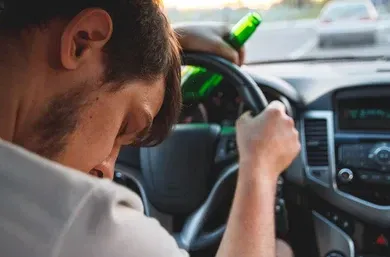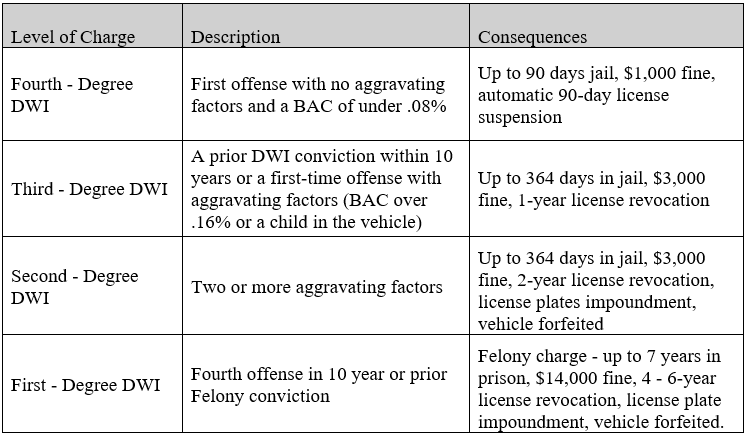DWI's in Minnesota

Being charged with a DWI can be a scary situation. It can also lead to serious legal, civil, and financial consequences. If you have been charged with a DWI you will likely have questions about what to do, and about what comes next.
WHAT IS A DWI?
Many people use the terms DWI or DUI interchangeably to refer to the same legal situation. In Minnesota DWI stands for Driving While Impaired. Minnesota does not have a legally defined use of the term DUI (Driving Under the Influence).
WHAT IS THE LEGAL DEFINITION OF DWI?
The legal definition of DWI in Minnesota is when any person either, drives, operates, or is in control of a motor vehicle while:
- Under the influence of alcohol
- Under the influence of drugs (can include prescription drugs)
- Having a blood alcohol concentration (BAC) of .08 or higher at the time of the offense or within two hours of driving a personal motor vehicle
- Having a blood alcohol concentration (BAC) of .04 or higher at the time of the offense or within two hours of driving a commercial motor vehicle.
- Knowingly being under the influence of a substance that significantly impairs your driving ability
- Having any amount of a Schedule I or II drug or its metabolite, except for marijuana and tetrahydrocannabinols, in your system
ARE ALL DWI OFFENSES THE SAME?
Not all DWI’s are the same in Minnesota. In fact, there are 4 levels, or “degrees” of legal charges for DWI’s. These levels go from fourth-degree, a misdemeanor, all the way up to first-degree, which is a felony. Most first-time offenders will be charged with a fourth-degree DWI, although there are instances where first-time offenders can be charged with a third-degree DWI, a gross misdemeanor.

**As noted above, Minnesota DWI’s laws provide enhanced penalties for prior DWI driving related conduct. **
Field Sobriety Testing
If you have ever watched a legal drama or a police show on television, you are likely familiar with roadside field sobriety testing. This is the testing that the police use to try to determine if someone has been driving while impaired. These tests can include:
- Horizontal gaze nystagmus (HGN)
- Walk and Turn test
- One-leg stand
These tests are used by the police to gain subjective observations upon which to base a decision on whether a driver is intoxicated or not. They are not always reliable indicators of intoxication, so it is important that you speak to an experience attorney to discuss any field sobriety testing, and the results, as soon as possible.
A second testing tool that is typically done roadside is the Preliminary Breath Test (PBT), more commonly known as a breathalyzer. A handheld machine is used to quickly measure a driver's BAC. These machines are notoriously inaccurate, but they inform the police as to a person’s general BAC, and they can be the basis for arresting someone for suspicion of DWI.
DO YOU HAVE TO PARTICIPATE IN FIELD SOBRIETY TESTING?
While the answer is no, you have the right to decline to participate in field sobriety testing including not providing a PBT, you should be aware that doing so will likely result in your arrest. Since the police use these tests to support an arrest for DWI it can sometimes be in your favor to refuse to participate as doing so will not result in any extra evidence, or claims, that you were driving while impaired that can later be used against you.
If you do choose to refuse the field sobriety testing and/or the PBT, you should do so respectfully and politely and you should reference your desire to speak with an attorney before any testing is completed. You should also immediately stop answering any questions about the incident.
AFTER THE ARREST
Once arrested, you will be taken back to the police station where you will be processed. A number of things should happen at this time:
- You should be read your Miranda Rights and then questioned about the incident. Other than giving preliminary information like your name and address, remember that you should decline to speak to officers or to answer any questions
- You should be offered time to call an attorney. It is very important, no matter the time of day or night, that you use this short window of time to try and reach an attorney to speak to. It is important that you don’t use this time to try and call other friends or family, as the police can take that opportunity away from you if you attempt this.
- You will be read the Minnesota Breath Test Advisory and will be requested to submit to a breathalyzer at the station. It is a minimum charge of a gross misdemeanor, and up to a felony, to refuse to take the test. Alternately, you could request to submit to a blood or urine test, but you have to make it clear to the police requesting the test which type of testing you want to submit to. It is very important to remember that blood or urine testing will show any substance in your system, while the breathalyzer will only show alcohol. If you refuse to submit a breath, blood, or urine test, you will be charged with an additional crime with enhanced penalties (see implied consent below).
IMPLIED CONSENT
Minnesota has Implied Consent laws. That is, when you sign up for your license and gain your driving privileges you acknowledge that you will be required under the law, once lawfully arrested for a DWI, to submit to a breath, blood, or urine test. Penalties for refusing can include:
- Loss of driving privileges
- Fines
- Requirement for installation of alcohol testing devices on your motor vehicle
It is also important to know that there is a civil side to all DWI cases in Minnesota separate from any criminal case. These are done through the Minnesota Department of Public Safety (DMV). You have a limited time of 60 days from the date of your license revocation to file a legal challenge. If you fail to file the correct paperwork to challenge the license revocation in this time period you waive your right to the challenge. Additionally, if you fail to challenge the license revocation your DWI revocation could stay on your license record even if you never get convicted of the DWI you have been charged with in criminal court.
CAN I GET MY DRIVING PRIVILEGES BACK SOON?
Even if your driving privileges have been revoked there are avenues available to you to get them back in a timely manner while your DWI is pending. It can be helpful to speak to an experienced attorney about these options including:
- Getting a limited license to drive to school, work, or the grocery store
- Installation of an ignition interlock system in your vehicle for full driving privileges while your case is pending
Conclusion
DWI’s can be a complex, confusing, and scary situation. If you, a friend, or a loved one, has been charged with a DWI offense in Minnesota it is important that you speak to an experienced criminal law attorney as soon as possible. An attorney can help you navigate through the process, get evidence, and discuss challenges to help you resolve your case.






